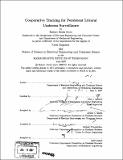Cooperative tracking for persistent littoral undersea surveillance
Author(s)
Scott, Robert Derek
DownloadFull printable version (11.17Mb)
Other Contributors
Massachusetts Institute of Technology. Dept. of Electrical Engineering and Computer Science.
Advisor
John J. Leonard .
Terms of use
Metadata
Show full item recordAbstract
The US Navy has identified a need for an autonomous, persistent, forward deployed system to Detect, Classify, and Locate submarines. In this context, we investigate a novel method for multiple sensor platforms acting cooperatively to locate an uncooperative target. Conventional tracking methods based on techniques such as Kalman filtering or particle filters have been used with great success for tracking targets from a single manned platform; the application of these methods can be difficult for a cooperative tracking scenario with multiple unmanned platforms that have considerable navigation error. This motivates investigation of an alternative, set-based tracking algorithm, first proposed by Detweiler et al. for sensor network localization, to the cooperative tracking problem. The Detweiler algorithm is appealing for its conceptual simplicity and minimal assumptions about the target motion. The key idea of this approach is to compute the temporal evolution of potential target positions in terms of bounded regions that grow between measurements as the target moves and shrink when measurements do occur based on an assumed worst-case bound for uncertainty. (cont.) In this thesis, we adapt the Detweiler algorithm to the scenario of cooperative tracking for persistent undersea surveillance, and explore its limitations when applied to this domain. The algorithm has been fully implemented and tested both in simulation and with postprocessing of autonomous surface craft (ASC) data from the PLUSNet Monterey Bay 2006 experiment. The results indicate that the method provides disappointing performance when applied to this domain, especially in situations where communication links between the autonomous tracking platforms are poor. We conclude that the method is more appropriate for a "large N" tracking scenario, with a large number of small, expendable tracking nodes, instead of our intended scenario with a smaller number of more sophisticated mobile trackers. The method may also be useful as an adjunct to a conventional Bayesian tracker, to reject implausible target tracks and focus computational resources on regions where the target is present.
Description
Thesis (Nav. E.)--Massachusetts Institute of Technology, Dept. of Mechanical Engineering; and, (S.M.)--Massachusetts Institute of Technology, Dept. of Electrical Engineering and Computer Science, 2007. Includes bibliographical references (leaves 39-40).
Date issued
2007Department
Massachusetts Institute of Technology. Department of Electrical Engineering and Computer Science; Massachusetts Institute of Technology. Department of Mechanical EngineeringPublisher
Massachusetts Institute of Technology
Keywords
Mechanical Engineering., Electrical Engineering and Computer Science.